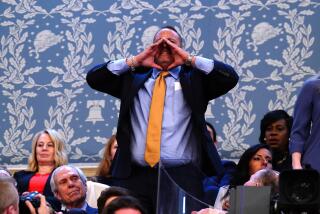Growing Up With Silver Stars but No Dad
- Share via
Kevin Phillips remembers his father as a gentle man--a man who never got angry, a man who loved his three young sons.
The 26-year-old machinist from Tustin also remembers the time his father showed him the tanks at Camp Pendleton, where they lived in the ‘60s. And he remembers going out to dinner with his father and sharing the same favorite drink, 7-Up.
But most of all, he remembers the day in 1967 when a Marine Corps officer in dress uniform came to the door to tell his mother that his father had been killed in action in Vietnam.
Phillips, a history major who is taking the Vietnam War class at Orange Coast College, was just 5 when his father died. Yet he retains more than just fragmentary memories of him.
“One thing I remember specifically: When you’re a father or a son and you touch someone in your family, you kind of feel the electricity of love, and I do remember that about my father,” he said. “As little as I was, I distinctly do remember that he was a loving, gentle man, which is kind of surprising for a career military officer. You don’t usually associate the two.”
Maj. Jack Phillips was 35 years old and on his third tour of Vietnam when he was killed on the night of Oct. 14, 1967. Ask Kevin Phillips about it, and he can describe in detail the events leading up to his father’s death.
“Most of it, the specifics, I got through the Freedom of Information Act when I was in high school,” he said. “I was always told, ‘Your dad’s a hero,’ and I wanted to know more about it.”
Phillips said his father was the commanding officer of G Company, 2nd Battalion of the 4th Regiment, attached to the 3rd Marine Division.
For about three weeks, Phillips said, his father’s company had been part of a defensive perimeter trying to prevent one division and a regiment of the North Vietnamese Army from crossing a bridge to gain access to the brigade’s rear.
On the night of Oct. 14, Phillips’ company was in the front of a triangle formation that was gassed by the enemy. After the company was pounded by rocket and mortar fire, elements of two North Vietnamese regiments overwhelmed the position. In rallying what was left of his men, Phillips exposed himself to small-arms fire and was killed.
He was awarded two Silver Stars posthumously, one for his action the night he died and the other for an incident several days earlier.
Kevin Phillips remembers that his grandmother fainted when she received word of his father’s death. His mother, he recalls, “was pretty stoic.”
As for him, “it was, in one sense shock, and in another sense I really didn’t understand. To me, being killed was like John Wayne in ‘The Sands of Iwo Jima’: There should be fifes and drums in the background. I didn’t really realize the brutality of it. When he was killed, as he fell, he fell face first onto a land mine, and it removed the body from the lower arm pits on up. You never think of someone being killed in that fashion. You always see them in the movies in some stoic, heroic thing.”
Growing up, Phillips thought of his father as a hero. But in high school, he said, “I went through a period where I was the radical. I was highly critical of the Vietnam War and the American attitude toward Third World countries, but I think that was more out of that being chic than me really forming some opinion. I’m actually kind of the opposite now.”
Phillips believes that it is important to expose students to classes on the Vietnam War: “One of the girls in the class said something I thought pretty much summed it up: ‘It (Vietnam) happened, so we should know about it.’ I think it’s something that is relevant to our times and has shaped a generation of people.”
As the son of a father who died in Vietnam, Phillips does not believe that study of the war is something he has to do to put the war--and his father’s death--behind him.
“I don’t think it’s really some great need to purge anything,” he says. “I think I probably did that a while ago. There are still times when I’ll go into a bookstore and look at a book and see a picture of the wall (the Vietnam Veterans Memorial), and it will literally bring a tear to my eye because I grew up without a father. But I think maybe because of that, that’s something I’ll have to deal with all of my life.”
More to Read
Sign up for Essential California
The most important California stories and recommendations in your inbox every morning.
You may occasionally receive promotional content from the Los Angeles Times.












